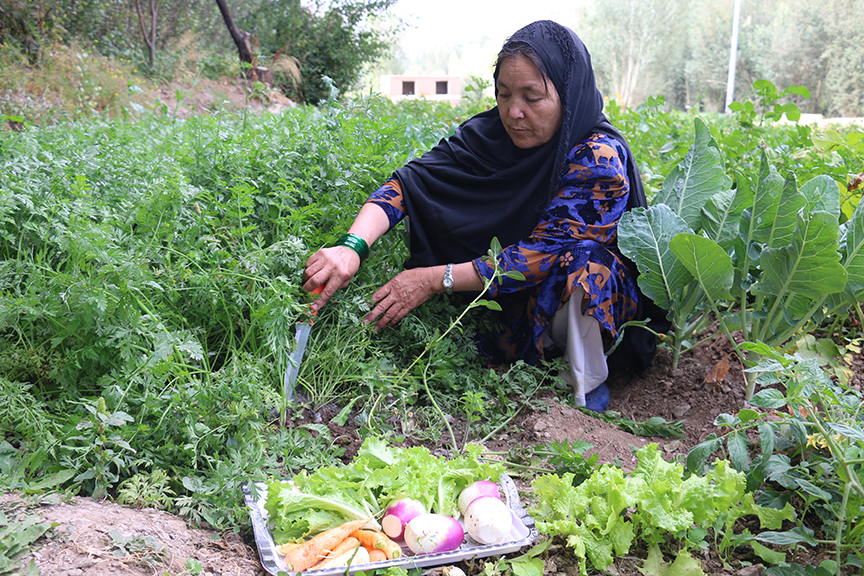Khateeja innovates her farming methods to improve food security and diversity in a crisis-hit Afghanistan
With the new leadership in Afghanistan transitioning to a functional government they have struggled to provide the Afghan people with security, adequate food, and economic opportunities. Khateeja and her family are among the millions affected by this regime change and its consequent impact on the country’s socio-economic status and livelihood market. Working as a government employee, Khateeja’s husband lost his job as soon as the new government took over, leaving the family with no formal source of income. The couple, along with their five children, rely solely on their two acre agricultural land in Nawrozi village of Bamyan province now. They work tirelessly to produce a healthy harvest of vegetables such as potatoes for household consumption and selling.
Life surely became harder for the family and especially fifty-five year old Khateeja who had to work twice as hard to care for her family and to put food on the table for her children and husband. They had little income, and with no external support. Their annual income from agriculture is AFN 150,000 (Approx. USD 1717) which is spent on purchasing essential food items and household necessities for the family. “We barely save any money for medical emergencies, nor can we afford to send all our children to school. My eldest sons, Yasin, 25, and Zaman, 20, could not study much due to financial constraints. The dramatically reduced employment options under the current regime have also deprived them from finding jobs. My three younger children, aged between 18 and 14, are studying and going to school. Paying for their schooling is a challenge. We occasionally lack the funds to purchase stationery and books,” shared Khateeja.
Selected under Community World Service Asia and Japan Platform’s humanitarian assistance project, Khateeja was provided with the opportunity of participating in a capacity-building activity for women in target villages of Bamyan. Fifteen other women from Nawrozi village participated in the training, receiving seeds and gardening kits to start their kitchen gardens.
Khateeja is one of the most active project participants under the project’s kitchen gardening component. “We received seeds of lettuce, radish, turnip and carrot at the end of the two-day kitchen gardening training in June 2022. The knowledge on seasonal vegetation development, fertiliser application, seed treatment, pest and disease control, irrigation techniques, and sustainable farming practices have proved to be very beneficial while cultivating and working in our gardens. I prepared a plot of free land outside my house and planted the seeds for the summer season from July to September. It was difficult to purchase diverse vegetables with a limited income so we would only cultivate potatoes before. We would mostly eat rice, potato, beans and peas; rarely would we have meat in our meals. However, today, I am cooking a variety of dishes from the fresh vegetables I have grown in my lush green garden.”
Before the training, Khateeja was not aware of the different types and kinds of vegetables she could sow on her land. She thought only one vegetable at a time could be cultivated in her garden. “Learning how to cultivate a variety of vegetables at the same time has brought food diversity on my table. I am now able to share some vegetables with my neighbours as well. After observing the benefits of my kitchen garden in terms of food diversity and cost savings, my neighbours have also started working on diversifying their own.”
This initiative has helped innovate Khateeja’s cultivation methods and supported her in producing better quality vegetables in larger quantities. Khateeja along with 449 other women have received practical training, eight kinds of vegetable seeds and a gardening tool kitunder the project. This extended cultivation season has provided families like Khateeja a range of different vegetables during the year and improved their purchasing power due to the saving.







